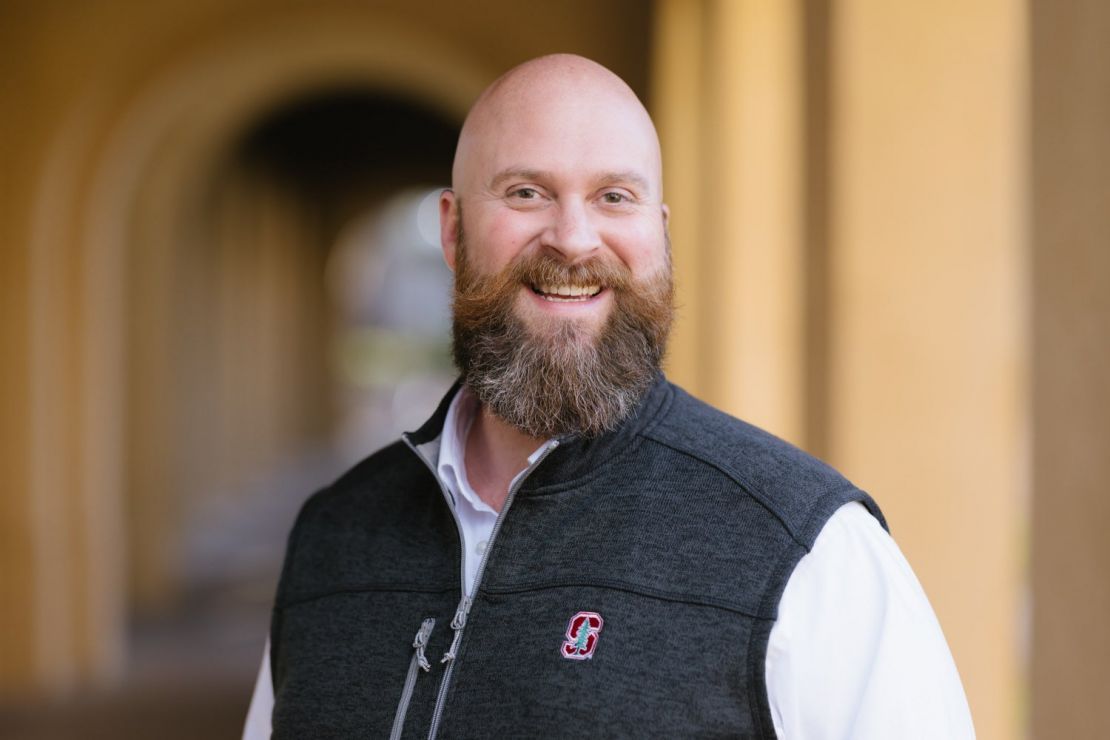
Shane Hale, program manager for the Office for Military-Affiliated Communities (OMAC) (Image credit: Micaela Go)
Shane Hale, program manager for the Office for Military-Affiliated Communities (OMAC), arrived at Stanford in September and is working to revitalize the office that provides support and community for veterans and active-duty military personnel on campus. Having worked in higher education for over 10 years, he talked about what brought him to Stanford and his goals for OMAC.
Why did you choose military service?
My motivation for joining the Army was social and economic mobility. I grew up in Mississippi in a low-income, first-generation situation, so I didn’t understand financial aid. I just knew that college was expensive, and I thought the only way I was going to be able to go was the GI Bill. After serving in the Army from 2001 to 2006 and deploying twice to Iraq, I enrolled in community college and then at my dream school, the University of North Carolina at Chapel Hill, where I received a B.A. in archeology. I am also currently a master’s degree candidate in higher education at Penn State.
What did you do after college, and what brought you to Stanford?
I worked at UNC Chapel Hill in various roles after graduating in 2011, including with community college transfer students and military-affiliated students. Then I moved on to become the inaugural program manager for the Adult and Military-Affiliated Student Services program at Northampton Community College in Pennsylvania.
I appreciated that opportunity, but when I saw the opportunity at Stanford to get back to a research university, I was excited to apply. I came to Stanford in September. I would love to make Stanford one of the top military-inclusive universities in the nation.
Is OMAC a new office?
No, the office has been around in different iterations since 2014. There have been a few other people in this role, but it has been vacant recently. The focus has also changed: In the past, this office also helped eligible students get their VA benefits. Now that function has moved to the Student Services office at Stanford, so I am focused on cultivating student engagement, a sense of belonging, and events and programming to support our military-affiliated students.
What issues do military-affiliated students face?
The difference between military and civilian life is significant, and the disparity between military and academic cultures is conspicuous. Veterans can face difficulties when they adjust to civilian life and transition into college life concurrently. This is caused by the difficulty of working through twin bureaucracies of the VA and higher education, while navigating new culture norms. Because the cultural and behavior norms of the military and higher education can be radically different, veterans must navigate through a series of cultural incongruities. In other words, they must negotiate an identity change, figure out how to access appropriate VA resources, and overcome feelings of isolation.
At Stanford, the undergraduate veterans are generally transferring from community college, so they have had two years of college to help them acclimate. But they are also older, nontraditional students and can feel isolated on a campus that caters to traditional-age students.
For reservists and National Guard members, who are serving part-time while in school, the challenge is navigating school while doing once-a-month training. They might get deployed or activated while they’re in school. Taking time off can be a challenge.
Some Stanford students participate in ROTC through cross-enrollment agreements with three neighboring universities. Under the agreements, students pursue their undergraduate degree at Stanford but complete the military portion of their training with the military unit at one of the host schools. Traveling back and forth for their training can create extra challenges for these students.
We also have some students in the graduate and professional schools who are going to school while they’re in the military. The military is paying for these students to go to grad school to prepare for their next job, and after they’re done, they will go back to the military.
What type of support does OMAC provide?
We are working on building that sense of community and belonging, and on celebrating the military-affiliated community on our campus. In the past, it doesn’t seem like there was a lot of community among the different military-affiliated communities. We are creating opportunities for them to hang out and talk with folks that have similar backgrounds.
For example, we have coffee socials every Friday morning, and we recently started having monthly dinners. We also held a Veteran’s Day reception at the Faculty Club and an open house for Family Weekend in February, and we are planning a graduation reception.
Veterans also need mentorship with alums who are also veterans – more like career help. We are working with Stanford Career Education (CareerEd) to talk about career initiatives and are looking at ways to engage alumni as mentors.
Do you only serve veterans of the U.S. military?
Our office supports and celebrates veterans from other countries, and some have participated in our coffee socials and dinners.
Are you doing any work with the broader campus?
Many of our military-affiliated students are veterans. Student veterans have been an important constituency that has contributed to the diversity of college and university campuses since the late 1940s, when veterans first became prominent in higher education following the end of World War II and the launch of the GI Bill programs. Veterans are a diverse group representing all racial and socioeconomic backgrounds. To provide comprehensive support, we work with other departments across campus.
For instance, we are collaborating with the FLI Student Success Center to actualize a Celebrate Transfer Week at Stanford in April. We have other collaborations in the works.
I am also working to implement military student ally training, which is a session on the student veteran experience. I’ve already done one training for the ASSU and hope to provide these sessions on a regular basis for any students, faculty, or staff members who are interested.